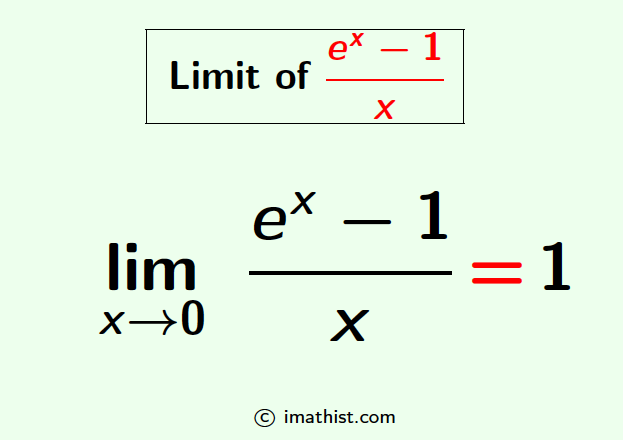The limit of (ex-1)/x, when x tends to zero, is equal to 1. That is, the formula of the limx→0 (ex-1)/x is given by
limx→0 (ex-1)/x = 1.
In this post, we will learn to find the limit of the function (ex-1)/x when x approaches to zero.

Limit of (e^x-1)/x as x→0
Prove that limx→0 $\dfrac{e^x-1}{x}$ = 1.
Proof:
Note that when we put x=0 in the function (ex-1)/x, we get 0/0, that is, the numerator and denominator both approach 0 as x tends to 0. So the given limit is an indeterminate form.
By l’Hopital’s rule, we have:
limx→0 $\dfrac{e^x-1}{x}$
= limx→0 $\dfrac{\frac{d}{dx}(e^x-1)}{\frac{d}{dx}(x)}$
= limx→0 $\dfrac{\frac{d}{dx}(e^x)-\frac{d}{dx}(1)}{\frac{d}{dx}(x)}$ by the difference rule of derivatives.
= limx→0 $\dfrac{e^x-0}{1}$ as the derivative of ex is ex and the derivative of xn is nxn-1 (power rule of derivatives).
= limx→0 $e^x$
= e0
= 1.
This proves that the limit of (ex-1)/x, when x goes to 0, is equal to 1. ♣
For the list of all limit formulae, click on the page `List of Limit Formulas`.
ALSO READ:
Limit of (1+$\frac{1}{n}$)n when n→∞
Question: Evaluate limx→0 $\dfrac{e^{2x}-1}{x}$
Solution:
limx→0 $\dfrac{e^{2x}-1}{x}$
= limx→0 $(\dfrac{e^{2x}-1}{2x} \times 2)$
= 2 limx→0 $\dfrac{e^{2x}-1}{2x}$
= 2 limt→0 $\dfrac{e^{t}-1}{t}$ where t=2x (so that t→0 when x→0)
= 2 × 1, by the above formula.
= 2
So the limit of (e2x-1)/x, when x tends to 0, is equal to 2.
You can read: Sum rule of limits: Proof
Quotient rule of limits: Proof
FAQs
Q1: What is the limit of (ex-1)/x when x tends to 0?
Answer: The limit of (ex-1)/x is equal to 1, when x tends to 0